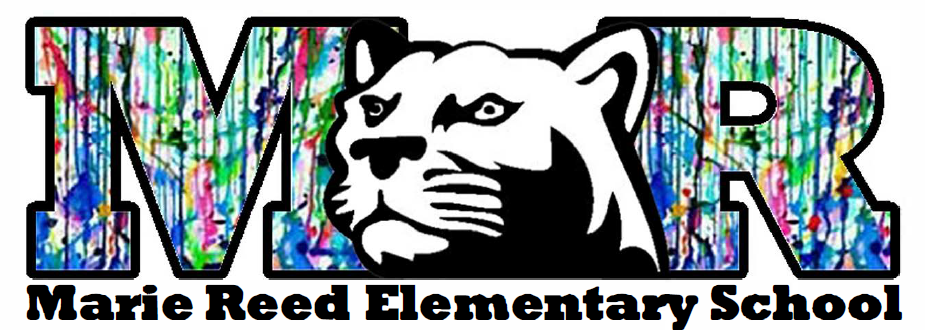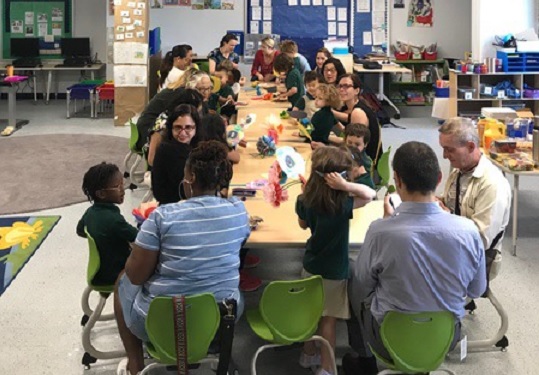Marie Reed Elementary School
We are Panthers! We are Proud! We are Powerful!
Behavior & Discipline
Our goal is to help students interact with the learning environment and school community in positive, responsible and productive ways. All DCPS schools are guided by the municipal regulations below.
- Chapter 25 – Student Discipline (Title 5 – D.C. Municipal Regulations)
- Chapter 24 – Student Rights and Responsibilities (Title 5 – D.C. Municipal Regulations)
In addition, DCPS has written a set of guidelines: DCPS Philosophy and Approach to Student Behavior and Discipline. This document describes the things that are most important to the DCPS community as we strive to provide a safe and effective learning environment for all students. The document is divided into four sections:
- Intentional School Culture. All people in schools will help create a positive, welcoming, safe, and productive learning environment. We will not simply post rules and punish students; we will be thoughtful about how we develop systems and procedures in schools, so that both students and adults are expected to show respect for each other, and are allowed to feel respected in return.
- Comprehensive Student Support . We recognize that some students need help to behave the way we expect them to behave. School staff will attempt to correct misbehavior first by making sure students are aware of what they are supposed to be doing, then by calming situations down before they get out of control, and finally by giving consequences. We will give extra support to students who repeat misbehavior.
- Instructional Approach to Behavior and Discipline . It is our responsibility to tell students clearly how we expect them to behave (“What are the rules?”). We must then teach students how to meet those expectations (“How am I supposed to behave in school?”). Before discipline situations become serious, we will work with students to calm down anger, talk through disagreements, and avoid problems. Finally, when students break the rules, we must give consequences that fit the misbehavior and allow the student to learn from the mistake (“What happens if I break a rule?”).
- Consistent, Progressive Discipline Responses that Minimize Disruption of Instructional Time. The entire school community must work together to support positive behavior, and the community must recognize that students of different ages need to have support and structure that matches their age. Overall, we must be respectful of individuals, take into account the needs of the whole community, and always keep our attention on the primary goal – to enable students to learn as well and as much as possible.
Marie Reed also utilizes Second Step and Conscious Discipline as approaches to social emotional learning throughout the school. These curricula aim to develop discipline, self-advocacy, empathy, and self-awareness among students.
Bullying Policy and Information
At Marie Reed, we are committed to providing a caring, friendly, and safe environment for our students so they can learn in a relaxed and secure atmosphere. School is a place where students learn the norms and mores of social interactions. As part of the socialization process, all students experiment with a range of behaviors as they learn how to socialize. However, students sometimes push the limits of this range and engage in behaviors we would consider bullying, as defined by DC Public Schools.
DCPS defines Bullying as: “Bullying, means any severe, pervasive, or persistent act or conduct, whether physical, electronic or verbal that:
May be based on a student’s actual or perceived race, color, ethnicity, religion, national origin, sex, age, marital status, personal appearance, sexual orientation, gender identity or expression, intellectual ability, familial status, family responsibilities, matriculation, political affiliation, genetic information, disability, source of income, status as a victim of an intrafamily offense, place of residence or business, or any other distinguishing characteristic, or on a student’s association with a person, or group with any person, with one or more of the actual or perceived foregoing characteristics; and
Shall be reasonably predicted to:
- Place a student in reasonable fear of physical harm to his or her person or property;
- Cause a substantial detrimental effect on the student’s physical or mental health;
- Substantially interfere with the student’s academic performance or attendance; or
- Substantially interfere with the student’s ability to participate in or benefit from school activities or services; or
- Materially and substantially disrupts the education process or the orderly operation of a school.
Reporting Bullying
Bullying or suspected bullying should be reported in person or in writing (including anonymously) to any Marie Reed staff or Administrator: Marie Reed Bullying Point of Contact is Mr. Patterson (Dean of Students) Richard.Patterson3@dc.gov
- School staff, coaches, and teachers of extra-curricular and co-curricular activities are required to report alleged incidents of bullying to the one of the Bullying P.O.C. Any other adult working or volunteering in the school will be encouraged to promptly report observed or suspected alleged incidents of bullying to any member of the Marie Reed staff.
- Students who are believed to have been bullied or are aware of incidents of bullying are strongly encouraged to report this behavior to a staff member or school administrator.
- Parents and other adults who believe that an incident of bullying has occurred are encouraged to report this behavior to a staff member or school administrator. Parents can also email or communicate directly to one of the Bullying Point of Contact in regards to any concerns.
- Acts of reprisal or retaliation against any person who reports an alleged incident of bullying are prohibited. Any student who is determined to have knowingly falsely accused another of bullying shall be subject to disciplinary consequences.
Responding
The Bullying Point of Contact will take action to include the following:
- Promptly investigate and respond to allegations of bullying behavior;
- Keep written documentation of all allegations of bullying behavior and outcomes of the investigations, and report alleged and substantiated incidents to the Head of School;
- Inform parent(s) or guardian(s) of the student(s) who was alleged to have bullied AND of the student(s) who was believed to have been bullied that a report of an alleged incident of bullying has been made;
- Communicate to the parent(s) or guardian(s) of a student(s) who was believed to have been bullied the measures being taken to ensure the safety of the student(s) who was believed to have been bullied and to prevent further acts of bullying;
- Inform parent(s) or guardian(s) of the students involved the findings of the investigation and actions to be taken;
- Communicate with local or state stake holders in regards to additional resources or case management
Disciplinary Action
Bullying in DC is currently a Tier 3 infraction, per Chapter 25, and can result in a variety of consequences. Schools are encouraged to determine and implement consequences and progressive discipline actions consistent with DCPS policies and procedures.
The following list of consequences are provided as a guide:
- Verbal redirection/reprimand
- Teacher/student conference
- Administrator/student conference
- Parental contact (written or by phone)
- Parent conference
- Temporary Removal of Student from Classroom
- Behavior contract
- In-School Disciplinary Action
- In school suspension
- Out of school suspension
While school administrators have discretion in applying consequences, the intention of the consequence should be to:
- Appropriately correct the bullying behavior,
- Prevent another occurrence of the bullying or retaliation,
- Protect the target of the bullying, and
- Be flexible so that in application they can be unique to the individual incident and varied in method and severity based on the nature of the incident, developmental age of the person bullying, and any history of problem behavior from the person bullying.
There are activities and conversations you can have with your children about bullies and bullying behaviors. Your children do not have to be targets of bullying. Empower your children to be confident and strong individuals who treat everyone with respect. A bully is no match to someone who has a good support network and a clear view of what is right and wrong. Finally, you can help your children become good friends and classmates who accept and help each other by creating an environment where differences are celebrated, and bullying is not tolerated. For additional information about bullying policies or information please feel free to click on the links below.
If you or your child has been involved in a bullying incident please contact your school to report it.
- DCPS Bullying Prevention Policy
- Stopbullying.gov
- dc.gov/publication/osse-bullying-policy
- childrensnational.org/advocacy/keyissues/bullying.aspx



